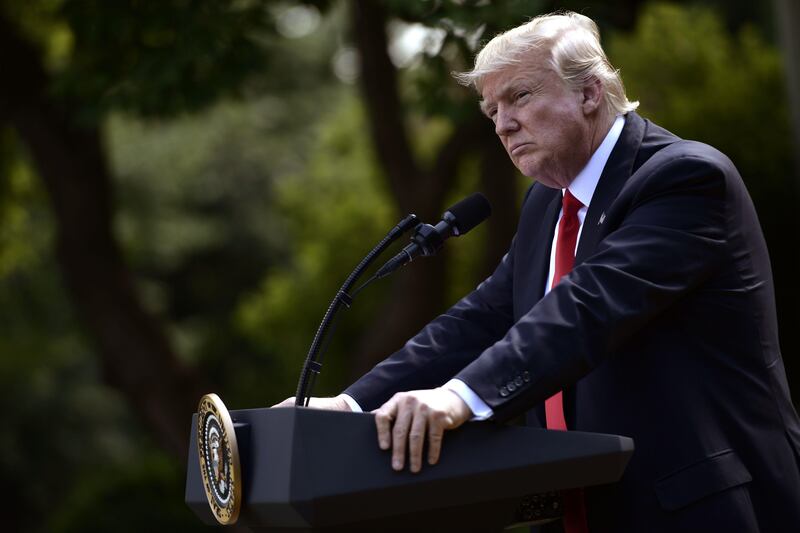With the United States Congress on the verge of expanding its sanctions against the pro-Iranian Hizbollah militia, it would seem that Washington is dead set on countering Tehran’s expanding influence in the Middle East.
But not so fast. While the Trump administration may be sincere in its desire to contain the Islamic Republic, its policies in Syria and Iraq have sown confusion, hardly an oddity for the current White House.
Nor has US president Donald Trump carried through with his threats to renege on or renegotiate the Iranian nuclear deal, which his administration has just recertified even as the US imposed more sanctions on Iran.
Nowhere has Mr Trump's thinking been more contradictory than in Syria. Last week, the administration announced that it would end military support for the Syrian rebels, in the process surrendering any political leverage it had over Russia and Iran in Syria.
In that way, the White House effectively gave both a wide berth to define a Syrian endgame. This will particularly benefit Iran, which controls the bulk of forces on the ground fighting on behalf of the Assad regime.
This was no slipup. US secretary of state Rex Tillerson was recently quoted by Colum Lynch and Robbie Gramer in Foreign Policy magazine, telling United Nations secretary-general Antonio Gutteres “that the fate of Syrian leader Bashar Al Assad now lies in the hands of Russia and that the Trump administration’s priority is limited to defeating ISIL”. The authors cited three diplomatic sources for their story.
In other words, the Trump administration has conceded that Syria’s future will be largely shaped by Russia in close collaboration with Iran, which regards Mr Al Assad’s political survival as a key aspect of its policy in the Levant.
One can be forgiven for misunderstanding the rationale behind wanting to contain Iran regionally, while giving it more room in the one place where Tehran’s expansionism has been most visible.
Such duality has been equally present in Iraq since 2014, following the takeover of Mosul by ISIL. Washington may have held its nose while doing so, but it participated heavily in the re-conquest of territory from the extremist group even though that meant collaborating with the Popular Mobilisation Forces, among which many groups are Iranian proxies.
Lately, the Lebanese government has been the target of criticism in the US and the Arab world for coordinating with Hizbollah in the party’s military campaign to oust radical groups from the hinterland east of the Beqaa town of Arsal near the Syrian-Lebanese border. At the same time, on July 22, the Kuwaiti government delivered a protest to the Lebanese government, demanding that it put pressure on the party to end its support for groups aiming to overthrow the Kuwaiti government.
The Lebanese government's inability to take action against Hizbollah is unlikely to arouse sympathy from critics.
However, the behaviour of the Trump administration had hardly represented a guide to officials in Beirut. Given Washington’s own de facto collaboration with pro-Iran groups against radical organisations in Iraq, the Lebanese may wonder in what ways doing so with Hizbollah around Arsal is so very different.
There may well be many holes in such an argument, but ironically, it is the Trump administration that is creating the ambiguities allowing for such sleights of hand. The real problem is that, beyond generalities, the administration doesn’t seem to have a clue as to how to counter Iran. Nor has it even bothered to rally its allies, as it once might have, to advance a collective regional effort to keep Iran in check.
Instead, the Arab world remains profoundly divided over a host of issues, from Syria to Iran to tensions in the Gulf, while the one country that could act as a unifier, namely the US, seems completely neutralised by its own domestic dysfunction. No one has imposed foreign policy discipline on the administration enough to outline priorities in the Middle East beyond fighting ISIL. Mr Trump seems disengaged and those around him are directionless.
For a moment, the accord reached between the US and Russia over southern Syria appeared to be an exception to this. By coming to an agreement outside the confines of the Astana process, thereby preventing Iran from having a say, Washington and Moscow reached a modus vivendi that could keep Iran and its allies in Syria away from the occupied Golan Heights and Jordan. Yet this aim did not square with subsequent US actions in Syria, which only widened Iran’s margin of manoeuvre.
Many Arab states like Mr Trump because, to them, he represents the opposite of Barack Obama. But that is no longer good enough. Mr Obama may have been terrible for the Middle East, but he was consistent in his cynicism. Mr Trump, in contrast, is all over the place. Soon, Arab regimes may realise that his bluster only conceals a deep cynicism of its own.





